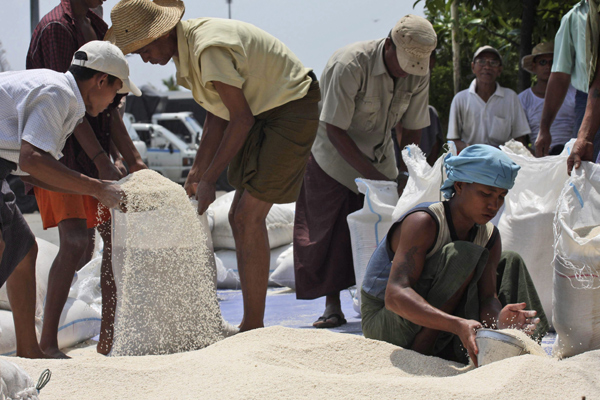The International Food Policy Research Institute has identified Africa among other regions with a high level of hunger, which it says is alarming.
This was contained in the 2013 Global Hunger Index released by IFPRI, Welthungerhilfe and Concern Worldwide, made available to the News Agency of Nigeria in Abuja on Monday.
According to the report: “The 2013 Index indicates that global hunger is decreasing; the 2013 World GHI score has fallen by 34 per cent from the 1990 GHI score.
“Yet world hunger still remains serious, with 19 countries suffering from levels of hunger that are either alarming or extremely alarming.
“South Asia has the highest regional GHI score, followed by Africa south of the Sahara while Burundi, Eritrea and Comoros have the highest levels of hunger.”
The report said that most of countries affected were vulnerable to the negative effects of extreme weather events, climate change, population pressure, conflicts and economic crises.
Also, traditional coping mechanisms as well as the capacity of governments were in many cases, hugely challenged, it said.
The report however, called for greater resilience-building efforts to boost food and nutrition security in the regions.
The resilience-building, it stated, should include prevention, mitigation and the promotion of development paths that would reduce exposure to shocks from climate change among others, in the longer term.
“Adopting a resilience lens is challenging. We need to build consensus on what it means and on that basis adopt programmes and policies that bridge the relief and development sectors,” said IFPRI’s Derek Headey in the report.
The report noted that collaboration in building resilience required new and better efforts to monitor and evaluate people’s existing vulnerabilities and the impacts of resilience-building activities.
Also, Dominic MacSorley of Concern Worldwide explained that building such resilience must focus on those living in life-threatening poverty and that programmes must deliver sustainable change in a longer term.
MacSorley said: “We must focus on those living in extreme poverty, learn the lessons of the past and be clear about what measures are needed to enable the very poorest to become more resilient in the longer term.
“Work in Kenya, Ethiopia, Niger and Chad is demonstrating how a resilient approach can deliver significant and sustainable change at community level.
“Turning this evidence into policy change is the next important step.”
The report further suggested developing a high-frequency surveillance system for the most vulnerable regions, focusing on communities as well as individual and household resilience.
In addition, it said: “Resilience-building objectives should be incorporated into national and regional development strategies as something distinct from conventional growth, poverty, or development objectives.
“Pursuing this will improve food and nutrition security for the world’s most vulnerable.”
According to the report, the Index identified hunger levels and hot spots across 120 developing countries and countries in transition.
It scored countries based on three equally weighted indicators – the proportion of people who are undernourished, proportion of children under five who are underweight and the mortality rate of children under five.
NAN reports that IFPRI is an international agricultural research centre designed to improve the understanding of national agricultural and food policies to promote the adoption of innovations in agricultural technology.
The institute also sheds more light on the role of agricultural and rural development in the broader development pathway of a country to seek sustainable solutions for ending hunger and poverty through research.
Hunger level in Africa still alarming, says 2013 Global Hunger Index report
Previous ArticleThe sex starved wife (1), by Anurika Onyelemelam
Next Article Sultan urges striking workers to return to work


